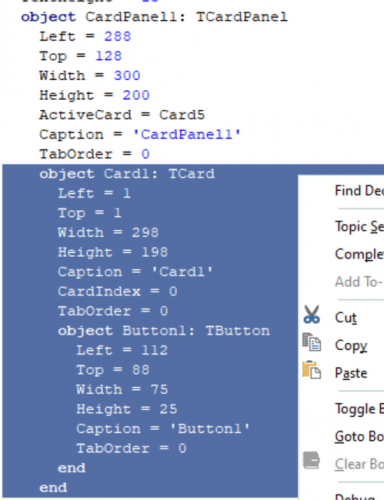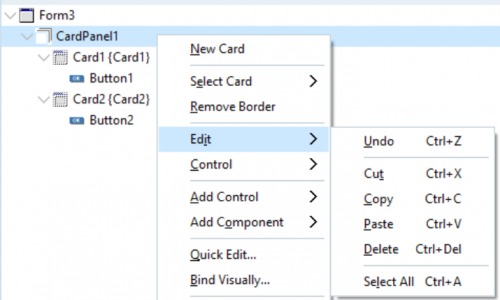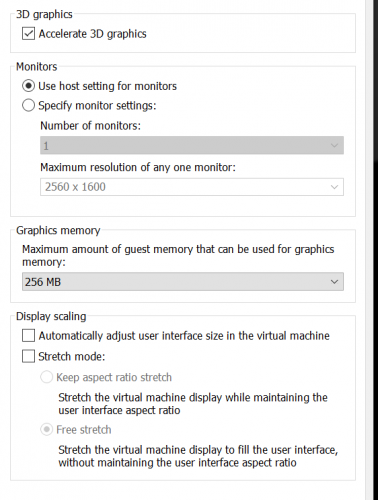-
Content Count
438 -
Joined
-
Last visited
-
Days Won
5
Posts posted by Cristian Peța
-
-
On 12/11/2020 at 8:35 AM, Lars Fosdal said:My perspective is from the VCL app where any number of frames and forms can have focus.
For your scenario reading the COM port is a better solution. We have only one form that displays many details related to scanned bar-code. Usually the user will work all the day only with a bar-code scanner. No keyboard, no mouse. And the installation must be as easy as possible. Some want to work on Linux, others on smart TV Box's with Android... so this year we moved this part in browser.
-
9 hours ago, Lars Fosdal said:or the scanner presents as a virtual keyboard (wedge configuration). The latter is something that we avoid.
A little off-topic but this depends. I prefer the scanner to be a keyboard because every client want to user their scanner and setup is very easy. Just plug the scanner into USB and is working.
With VCL I use Form.OnKeyDown with Form.KeyPreview=True.
Even in browser I use document.addEventListener("keydown", WAKeyDown). This way if the web app tab in the browser has focus I receive the input from the keyboard. No need to have a edit box in focus.
And reading a serial port in Javascript is not so straightforward.
But there can be a issue if you want to distinguish between a real keyboard and barcode reader.
-
 1
1
-
-
-
--old news--
-
Patch is just released.
https://blogs.embarcadero.com/delphi-compiler-and-lsp-patch-for-rad-studio-10-4-1/
-
 1
1
-
-
2 hours ago, alogrep said:table1:=Tslim.Create
You told as that a component is becoming nil. Nil can be a reference to an instance of a class (namely a variable), not a class itself.
If table1 is that component that is becoming nil then put a data breakpoint on table1. More exactly on table1's address (namely @table1). But it is enough to write table1 into the addresses field of "Add Data Breakpoint" dialog.
@Remy Lebeau thank you very match for this. I needed a data breakpoint sometimes but I didn't know they actually exists.
-
Splitting is useful if you use for backup something that compares the files and only overwrite those that changed.
-
3 hours ago, David Schwartz said:Nobody likes that we do work in one folder and git is constantly shuffling around files in other folders, and throwing up conflicts because someone else is in the middle of doing some work that has nothing to do with what you're working on. Branches only seem to make things worse. When I do a branch, I only want to focus on a given folder.
In this case I think it would be better to have all that folders in one repo. Then a branch would not be disturbed because all is there.
You will have to deal with conflicts only at merge.
-
7 minutes ago, dummzeuch said:When the IDE started with my custom layout (which is not a floating designer layout), I get an AV in rtl270.bpl.
Something like this?
-
7 hours ago, Dalija Prasnikar said:I never needed forums to solve my problems... I could find all the answers on SO and official documentation.
If you are not in the first wagon then yes, others ask for you.

I just setup a SSH and Git as server on Windows using OpenSSH that comes with Windows 10 but this came only two or three years ago and information is not yet well polished. Git as a server on Windows is also not so frequently used.
It was enough the information I found, I did not need to ask for help, but it was harder than I thought. Now I think that doing the same thing on Linux is easier because almost all info is for Linux.
Installing Subversion server on Windows was a piece of cake some years ago.
-
Not about Delphi IDE but I just tried to take a snip of the screen with Windows logo key+Shift+S. It is sooo slow in VMware to select that rectangle.
-
28 minutes ago, Angus Robertson said:TCP buffer size of 66536
Maybe I am wrong but it is not 2^16=65536?
-
-
-
I know it is frustrating but the result is same for me.
-
I tried with "Enable Flow Control Highlighting" disabled in 10.4 but I do not see any difference. It is a little slow only when bottom white space appears.
-
This issue is visible starting with D10.0 Seattle. Delphi XE-XE5 does not behave like this.
But only when you see bottom white space.
-
D10.4 with i7-8700K
For me anywhere in the source IDE CPU is 10% and very responsive.
At the bottom when white space appears is 25% and a little slower but not an big issue. I rarely use scrolling when bottom white space is shown.
I think this issues is tied to CPU speed + Number of LOC displayed when bottom white space is shown. No graphic card involved.
Try to make the IDE height smaller in order to display fewer lines of code and for sure it will be faster and.... useless.
Does it behaves better on host? I think does not.
-
I have almost the same configuration and bellow settings for display but I don't see any issues with scrolling. In VM is Windows 1903, on host 2004.
I don't do any adjustments to the IDE after instalation.
I will try to install Windows 2004 also in one VM and see.
Update: I can install now Windows 2004 only on older VM's, on newer VM's with D10.3.3 and 10.4 I have this message "The Windows 10 May 2020 Update is on its way. Once it’s ready for your device, you’ll see the update available on this page."
-
THTTPClient doesn't work on Windows 7 and XP with SSL.
On XP the message is "Server Certificate Invalid or not present"
I don't find the message from Windows 7 but here is something about:
-
 1
1
-
-
Then it looks like it's deallocated at close. Maybe if you can debug and look in task manager. Put a break point in System._Halt0 and maybe you will see where is deallocated.
Maybe deallocation is in finalization sections or some dll's.
Maybe this MemoryUsed function can be called from watch list and compared with Task manager.
-
1 hour ago, Lars Fosdal said:neither FastMM nor EurekaLog reports what is leaking
But reports something or doesn't report anything?
-
44 minutes ago, Stefan Glienke said:Also shouldn't FastReports have fixed that code some while ago given they support 10.2 and higher?
From what I see it's fixed like this:
var p : PWord;
-
 1
1
-
-
5 hours ago, kzaveri19 said:When the error is caught, cursor stays in the same cell, but wrong value displayed across all records
I can't reproduce this issue (the wrong value to be displayed across all records). What Delphi version do you use?
Try to do a minimal example to reproduce this and post here.
5 hours ago, kzaveri19 said:I modified your code slightly
But why ?!? Your code is more convoluted and I don't see any benefit. Only trouble.
![Delphi-PRAXiS [en]](https://en.delphipraxis.net/uploads/monthly_2018_12/logo.png.be76d93fcd709295cb24de51900e5888.png)





"This release is not compliant with the Google Play 64-bit requirement"
in Cross-platform
Posted
Does this app compiled for 64-bit works?
Have you tried to upload only with 64-bit binaries?